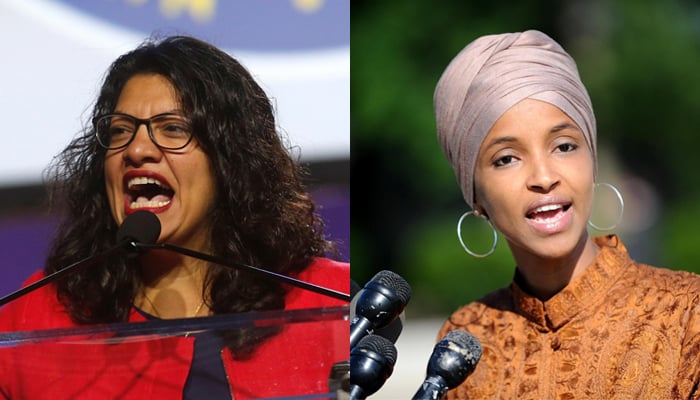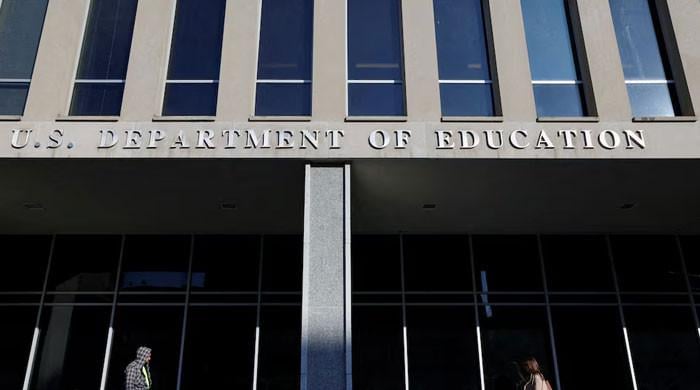Israel to bar visit by US congresswomen Ilhan Omar, Rashida Tlaib: ministry
Israel's interior ministry said its decision to bar Omar and Tlaib was in line with law banning entry to foreigners who support boycotting Israel
August 15, 2019

JERUSALEM: Israel said Thursday it will bar a planned visit by two US congresswomen who have supported a boycott of the country over its treatment of Palestinians, a decision in line with President Donald Trump's urgings.
Israel's interior ministry announced the decision that it said was in accordance with a law banning entry to foreigners who support boycotting the country.
Rashida Tlaib, who is of Palestinian origin, and Ilhan Omar were expected to arrive in Israel at the weekend for a visit that would take them to the Palestinian territories. Along with two other progressive congressional allies, Alexandria Ocasio-Cortez and Ayanna Pressley, they are known as "the squad" and have consistently been in Trump's crosshairs.
Trump, earlier today, urged Israel to boycott the congresswomen, saying allowing them "would show great weakness".
Trump added: "They hate Israel & all Jewish people, & there is nothing that can be said or done to change their minds. Minnesota and Michigan will have a hard time putting them back in office. They are a disgrace!"
Prior to Trump's tweet, an Israeli government official, on condition of anonymity, had said earlier in the day that Prime Minister Benjamin Netanyahu held consultations on the visit on Wednesday to weigh on a final decision.
"There is a possibility that Israel will not allow the visit in its current proposed format," the official had said. "Professional teams and legal counsel in various government ministries are continuing to examine the decision.
Israel accuses BDS movement of anti-Semitism
"According to Israeli law, the authority lies with the minister of the interior," the official noted, adding, however, that "if Congresswoman Tlaib makes a humanitarian request to visit her family, the decision on her matter will be considered favourably".
In 2017, Israel passed a law banning entry to foreigners who support boycotting the country.
The law was passed in response to the Palestinian-led Boycott, Divestment and Sanctions (BDS) movement to boycott Israel as a means to pressure the country over its treatment of the Palestinians.
Israel sees the movement as a strategic threat and accuses it of anti-Semitism — a claim that activists deny, saying they only want to see the occupation end.
Prominent Arab Israeli parliament member Ayman Odeh said: "A country with nothing to hide wouldn't have banned the entrance of two members of Congress.
"Another desperate attempt to hide the reality to the world," he wrote on Twitter.
Outspoken Trump critics
Both Omar and Tlaib have been critical of Israel's occupation of the West Bank and treatment of Palestinians. The Democrats have also faced accusations of anti-Semitism, which they firmly deny.
The Israeli ambassador to the United States, Ron Dermer, had previously signalled the two congresswomen would be allowed to visit out of respect for Washington, Israel's most important ally.
But the two are also outspoken political opponents and critics of Trump, who has a close relationship with Netanyahu. The US president has taken aim at the four in a series of xenophobic comments, telling them to "go back" where they came from and accusing them of having "love" for America's "enemies like Al-Qaeda," among other remarks.
Ocasio-Cortez, a 29-year-old of Puerto Rican ancestry, is the youngest member of the House of Representatives, while Pressley is the first African-American elected to Congress from Massachusetts.
Omar, who fled war-torn Somalia as a child and arrived in the US as a refugee, and Tlaib are the first two Muslim women elected to Congress.
Tlaib is also the first woman of Palestinian descent in Congress.
Members of Congress are regular visitors to Israel and the Palestinian territories and blocking them would be a highly unusual move.
It would occur at a time when Jewish groups in the US have expressed concern over whether bipartisan support for Israel in Washington is eroding.
Democratic candidates for president in the US have openly criticised Netanyahu, who is seeking re-election in Israel on September 17 after polls earlier this year failed to yield a coalition.











